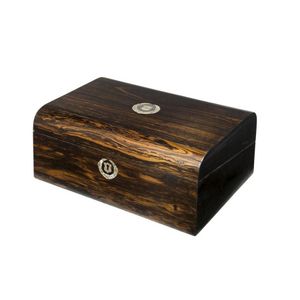Zuni Butterfly Fetish Necklace
A Rosita Wallace butterfly silver necklace inlaid with Mother of pearl, black onyx, turquoise & coral, signed R. Wallace, Zuni Indian tribe, native American, note, in Zuni culture a fetish is believed to hold magical powers & protect the owner. Butterfly represent beauty, transformation & rebirth, length 46 cm
You must be a subscriber, and be logged in to view price and dealer details.
Subscribe Now to view actual auction price for this item
When you subscribe, you have the option of setting the currency in which to display prices to $Au, $US, $NZ or Stg.
This item has been sold, and the description, image and price are for reference purposes only.
- Onyx - Onyx is a form of agate, used from antiquity and popular again in the 1920s and 30s. European onyx is generally green, but can be many other colours, and can contain bands of black and/or white.
This multicoloured stone is widely used for table tops, lamp bases and in jewellery. Some types of onyx are also used for cameos of which the upper white layer is cut away to reveal the colour beneath. - Mother-Of-Pearl - Mother-of-pearl, technical name "nacre", is the inner layer of a sea shell. The iridescent colours and strength of this material were widely used in the nineteenth century as an inlay in jewellery, furniture, (especially papier mache furniture) and musical instruments.
In the early 1900s it was used to make pearl buttons. Mother-of-pearl is a soft material that is easily cut or engraved.
Nowadays it is a by-product of the oyster, freshwater pearl mussel and abalone industries. - Coral - Coral used in jewellery. Coral is a material that is commonly used in jewellery making. It is made up of the skeletons of tiny marine animals called coral polyps. There are many species of coral, but only one group, Corallium, is suitable for carving, and thus can be used in jewellery manufacture. These have a deep red or pink orange skeleton and are known as "noble coral" or "precious coral".
This item has been included into following indexes:
Visually similar items

French marquetry commode in the Louis XV style. Ormolu mounts & handle, with rouge marble top. Late 18th to early 19th century. Height 88, width 126 cm, depth 50 cm
Sold by
in
for
You can display prices in $Au, $US, $NZ or Stg.

18ct wedding band bright cut floral pattern with enamelled 'M H Chung' title
Sold by
in
for
You can display prices in $Au, $US, $NZ or Stg.

Silver & turquoise locket on fine silver chain
Sold by
in
for
You can display prices in $Au, $US, $NZ or Stg.

A coromandel writing slope with mother of pearl inlay, mid 19th century. 15 cm high, 35 cm wide, 24 cm deep
Sold by
in
for
You can display prices in $Au, $US, $NZ or Stg.
